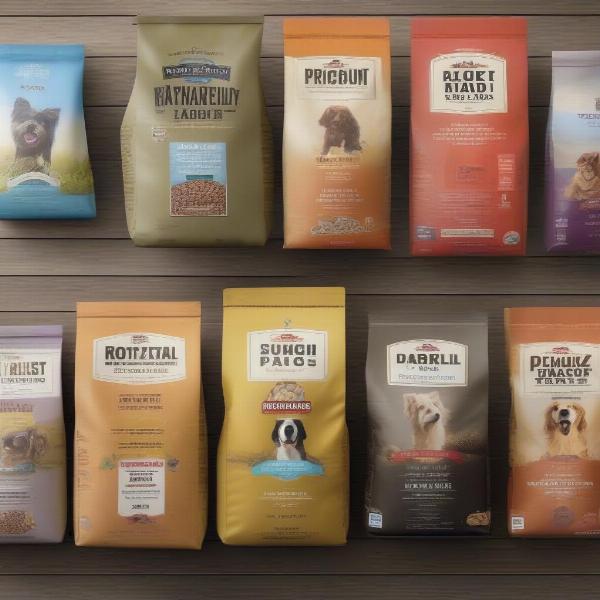German Shepherds are known for their intelligence, loyalty, and active lifestyles. As a responsible owner, providing the right nutrition is crucial for their overall health and well-being. Choosing the worst dog food can lead to a variety of health issues, impacting your German Shepherd’s energy levels, coat quality, and even lifespan. This guide will help you identify what to avoid when choosing food for your German Shepherd.
Choosing the right food for your German Shepherd can be overwhelming with so many options available. Unfortunately, not all dog foods are created equal. Some contain fillers, artificial ingredients, and low-quality protein sources that can be detrimental to your dog’s health. Knowing what constitutes the “worst” dog food can save your German Shepherd from potential health problems. This article will explore the ingredients to avoid, the importance of a balanced diet, and provide recommendations for selecting the best food for your loyal companion.
Identifying Red Flags in Dog Food Ingredients
One of the biggest red flags when choosing dog food for German Shepherds is the presence of fillers like corn, wheat, and soy. These ingredients offer little nutritional value and can cause digestive issues and allergies. Artificial colors, flavors, and preservatives are also detrimental, potentially leading to long-term health problems. Low-quality protein sources like meat by-products are another ingredient to steer clear of. Your German Shepherd needs high-quality animal protein to thrive.
Why Balanced Nutrition is Crucial for German Shepherds
A balanced diet is especially important for German Shepherds, a breed prone to hip and elbow dysplasia, digestive sensitivities, and skin allergies. A diet rich in high-quality protein, healthy fats, and essential vitamins and minerals supports joint health, a strong immune system, and a healthy coat. Avoiding foods high in carbohydrates and fillers helps maintain a healthy weight and prevents digestive upset.
Common Mistakes to Avoid When Choosing Dog Food
Many owners unintentionally choose poor-quality food due to misleading marketing tactics or a lack of understanding of canine nutrition. Don’t be fooled by labels that claim “natural” or “premium” without carefully examining the ingredient list. Look for foods that specify the source of animal protein, such as “chicken meal” or “beef meal,” rather than generic terms like “meat by-products.”
 Misleading dog food labels with vague claims
Misleading dog food labels with vague claims
Opting for High-Quality Dog Food: What to Look For
When choosing food for your German Shepherd, prioritize high-quality animal protein as the first ingredient. Look for foods specifically formulated for large breed dogs, as these often address breed-specific nutritional needs. Consider your dog’s age, activity level, and any existing health conditions when selecting a food. Consulting with your veterinarian is always recommended to determine the best dietary plan for your individual dog.
The Impact of Poor Nutrition on a German Shepherd’s Health
Feeding your German Shepherd poor-quality food can manifest in various ways. You might notice a dull, dry coat, digestive problems like diarrhea or vomiting, decreased energy levels, and even behavioral changes. Long-term, poor nutrition can contribute to more serious health issues like obesity, joint problems, and a weakened immune system.
Conclusion
Choosing the right dog food is a critical aspect of responsible German Shepherd ownership. By avoiding foods with fillers, artificial ingredients, and low-quality protein, you can ensure your dog receives the nutrition they need to thrive. Prioritize high-quality ingredients and consult with your veterinarian to create a dietary plan tailored to your German Shepherd’s individual needs.
FAQ
- What are the most common food allergies in German Shepherds? Common allergens include beef, chicken, dairy, wheat, and corn.
- How can I tell if my German Shepherd has a food allergy? Symptoms can include itching, skin rashes, vomiting, and diarrhea.
- Is grain-free dog food always better for German Shepherds? Not necessarily. While some dogs benefit from grain-free diets, others do not. Consult your vet.
- Should I supplement my German Shepherd’s diet with vitamins or minerals? Only if recommended by your veterinarian.
- How often should I feed my adult German Shepherd? Most adult German Shepherds thrive on two meals per day.
- What are some good protein sources for German Shepherd dog food? Chicken, lamb, fish, and beef are all good sources of protein.
- How much food should I feed my German Shepherd puppy? Follow the feeding guidelines on the puppy food packaging and consult your vet.
About ILM Dog
ILM Dog (ilmdog.com) is your trusted international resource for all things dog-related. We offer expert advice on breed selection, health and medical care, training, nutrition, grooming, and much more. Our team of experienced writers and dog enthusiasts are dedicated to providing practical, reliable information to help you give your canine companion the best possible care. For personalized advice or to learn more about our services, contact us at [email protected] or call us at +44 20-3965-8624. We are passionate about helping dog owners worldwide create happy, healthy lives for their furry friends!